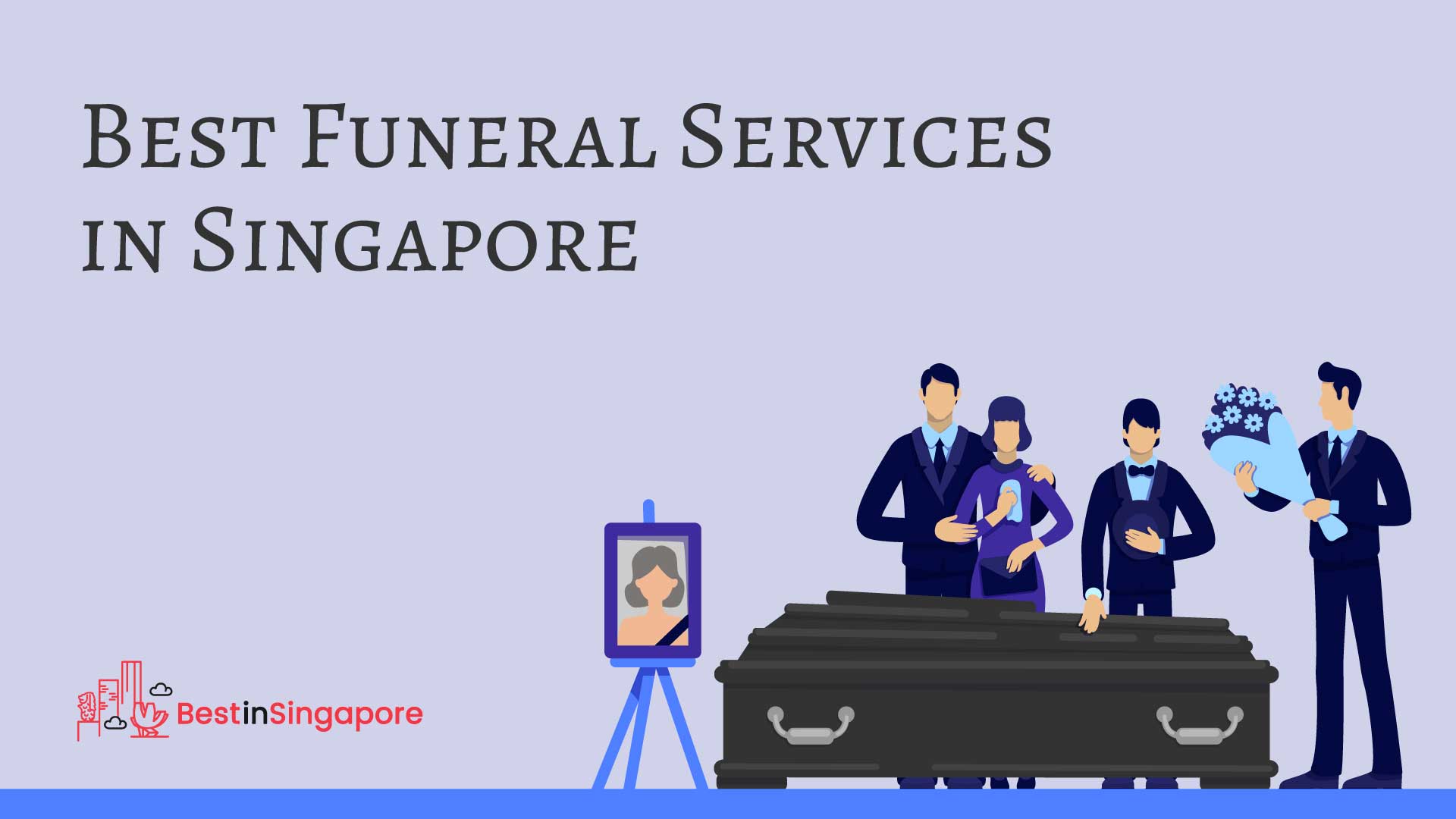Grace in Grief: The 23 Best Funeral Services in Singapore
Funeral services in Singapore are a blend of tradition and modernity, reflecting the rich cultural diversity of our city-state. With a unique mix of Chinese, Malay, Indian, and Western customs, Singapore funerals are a solemn yet fascinating affair.
The Singapore government also regulates funeral homes to maintain high service quality and ensure the dignity and respect of the deceased. Let’s take a look at some of the best ones that meet the country’s meticulous funeral industry standards.
How much does a funeral service cost in Singapore?
Funeral costs in Singapore vary based on length and religious considerations. Longer services tend to be more expensive. Funeral arrangements range from extremely cheap to expensive, so finding an affordable funeral home is crucial.
A typical funeral service includes a room, decorations, casket, furniture, lighting, fans, and flowers, costing between S$4,000 and S$7,500.
Religious funerals can be pricier due to ceremonial items, with a two-day Taoist funeral costing up to S$8,300. Non-religious funerals are generally cheaper at around S$3,000 to S$4,000.
How We Picked
1. Woodlands Memorial
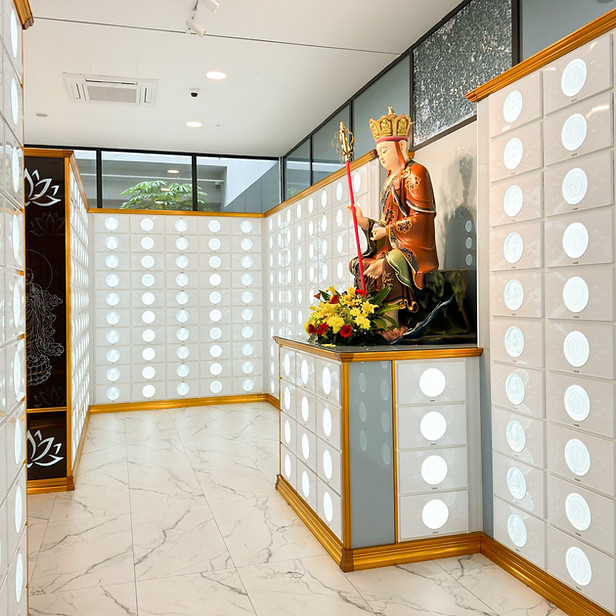
Website: https://www.woodlandsmemorial.sg/
Instagram: https://www.instagram.com/woodlandsmemorialsg/
Address: Woodlands Memorial 7 Woodlands Industrial Park E8 Singapore 758969
Contact: (+65) 8833 7877 / [email protected]
Hours: 5 pm to 9 pm daily
Woodlands Memorial is a compassionate and dignified funeral service provider, offering a serene space for families to bid farewell to their loved ones. As the first funeral parlour and columbarium built on government-launched land, Woodlands Memorial sets a new standard for respectful and inclusive bereavement services in the region.
The facility offers a wide range of funeral parlours with seating capacities from 60 to 1,000, designed to accommodate the needs of all religions. Each funeral hall is equipped with a Private Family Restroom, complete with a living space, bedroom, toilet, and shower, ensuring that families have a comfortable and private space during their time of grief.
Woodlands Memorial’s columbarium, located on the 8th and 9th floors, provides a peaceful resting place for loved ones. The niches cater to all religions and are housed in air-conditioned halls, allowing families to visit in any weather. The sky gardens surrounding the columbarium add to the tranquil atmosphere, offering a calming environment for remembrance.
With a clear mission to offer comfort and dignity in times of loss, Woodlands Memorial strives to be a place where families can celebrate the lives of their departed loved ones in peace. Their vision is to create a space that provides solace and support, ensuring that every farewell is respectful, meaningful, and serene.
Pros
- Years of industry experience
- Affordable funeral packages
- Responsive team
Cons
- No promos at the present
Customer Reviews
“I held my father’s funeral at Woodlands Memorial early Sept. The environment was tranquil, very clean and well designed to hold such services. I was assisted by Peter of WM and Siam from Singapore Funeral Group. Both helped a great deal with all details of the funeral from day 1. Peter handled any issues I faced readily. He was always on hand to ensure we do not have any worries during the difficult time. Siam and team were knowledgeable and professional with the entire funeral services. Also very ready to handle any queries we had. Both team worked well together to ensure we had nothing to worry for the whole process. We are grateful how they manage the funeral process well and proper while we try to get through the difficult period.” — Jazreen Leon
“Our beloved father recently passed away peacefully and our experience to hold his funeral service at Woodlands Memorial was well organized and seamless. We started a few months ago looking for an ideal resting place for our terminally sick father. When we arrived at the Woodlands Memorial, we were warmly greeted by Assistant General Manager Peter and he was very kind and patient to show and explain to us all the halls, suites and the columbarium. He also explained clearly to us the funeral packages available and the price of the double niche we needed at the columbarium. The venue provides a one-stop funeral services, which handles from the start of the moment on your loss of your loved one to the wake, prayers, cremation, ash collection and placement of the urn to their Columbarium. The facilities are new, clean, modern and spacious with sky gardens on various floors, which added the ideal peacefulness and calming environment during the visits to the Woodlands Memorial. Google its website and everything is true to what we have experienced there. What made this place our choice for our beloved father, were both their great facilities and most important the caring people, who assisted us through the funeral process. Special mentions to Peter, who was physically and emotionally with us throughout our 5 days’ wake and always ready to assist us on all our requests. Siam and his team, who guided and walked through with us during the wake and cremation, and not forgetting the wonderful smiling housekeeping staff, who regularly clean up our hall and stock up our drinks promptly. Without any doubts, our families were delighted to make our right decision to select the Woodlands Memorial and highly recommended everyone to visit the place and meet the professional and wonderful team there.” — Alex Ting
2. Nirvana Singapore
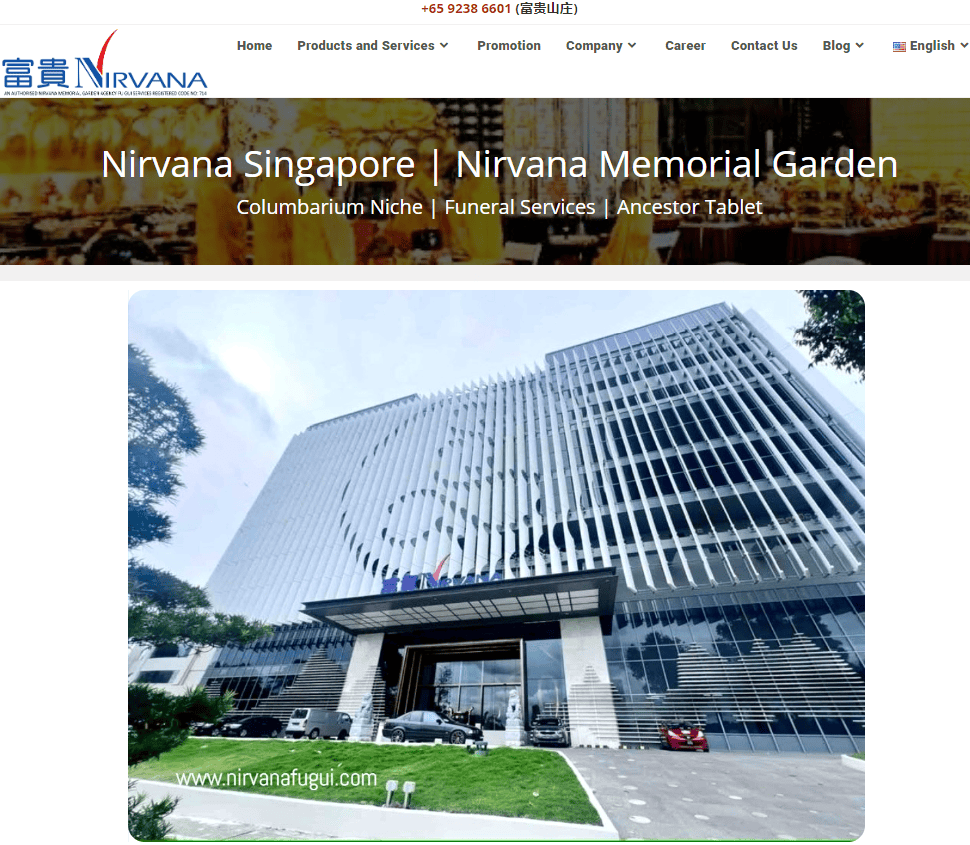
Website: https://www.nirvanafugui.com/
Services: Columbarium, Funeral Service Package, Buddhist funeral service, Prayer Services, Ancestral Tablet
Instagram: https://www.instagram.com/nmg.singapore/
Address: 950 Old Choa Chu Kang Road, Singapore 699816 (Google Maps)
Contact: +65 9238 6601 | [email protected]
Hours: Open 24/7
Since 2009, Nirvana Memorial Garden (富贵山庄) has been offering a sense of grandeur in the funeral industry. For instance, its one-of-a-kind luxury hearse in Asia ensures that the departed embark on their final journey with the utmost solemnity and respect.
Catering to various beliefs, including Buddhism, Taoism, Christianity, and Free Thinking, Nirvana offers comprehensive funeral service packages, prayer services, cremation urns, ancestor tablets, and columbarium niches.
It underlines Chinese bereavement culture by honouring ancestors and emphasises the importance of afterlife pre-planning with interest-free instalment plans and promotional rates.
Nirvana Memorial Garden is located in a tranquil setting with greenery, trees, and open spaces, suitable for quiet contemplation. It offers a best-in-class, beautifully designed columbarium as a dignified final resting place.
Pros
- Tranquil location
- Offers luxury amenities
- Interest-free instalment plans
Cons
- Not available 24/7
- Pricier rates
Customer Reviews
Professional services in Columbarium
“Kehsin and Tim very friendly and patient bring me a site tour and explaining the Nirvana Memorial Garden provides complete afterlife services which include columbarium niches, professional funeral services, ancestral tablets and prayer sessions. Pre-planning for our families according our needs. High recommended.”
– Jazreel Loh, Google Reviews
Provided excellent service in Funeral Services
“Notes to Nirvana Memorial Garden
Mdm Ang Keh Sin
Thanks to Nirvana Fu GUI Shan Zhuang Mdm Ang Keh Sin
In our darkest hour, when our hearts were heavy with grief and our minds clouded by sorrow of my son who passed away in Oversea. We were fortunate to have encountered an exceptional funeral parlor agent who went above and beyond to provide solace and support. Words cannot express the depth of gratitude we feel for the invaluable assistance extended to us by Nirvana Memorial Garden Agents Mdm Ang Keh Sin and her team members.
They were impeccable. From coordinating the funeral arrangements to ensuring that every aspect of the service ran smoothly, they handled it all with grace and efficiency. It was evident that they took immense pride in their work, treating our loved one with the utmost respect and dignity. Keh Sin is not only fulfill the customary duties but to go the extra mile was truly remarkable. One particular gesture prayer that touched our hearts was their offer to light incense sticks and provide prayer food on our behalf to my son. Honoring our traditions and ensuring our loved one’s peaceful transition. We are forever grateful for their support during our trying period and highly recommend their services to anyone in need of a compassionate and caring funeral parlor agent.”
– Ivy Lee, Google Reviews
3. Empathy Funeral Service
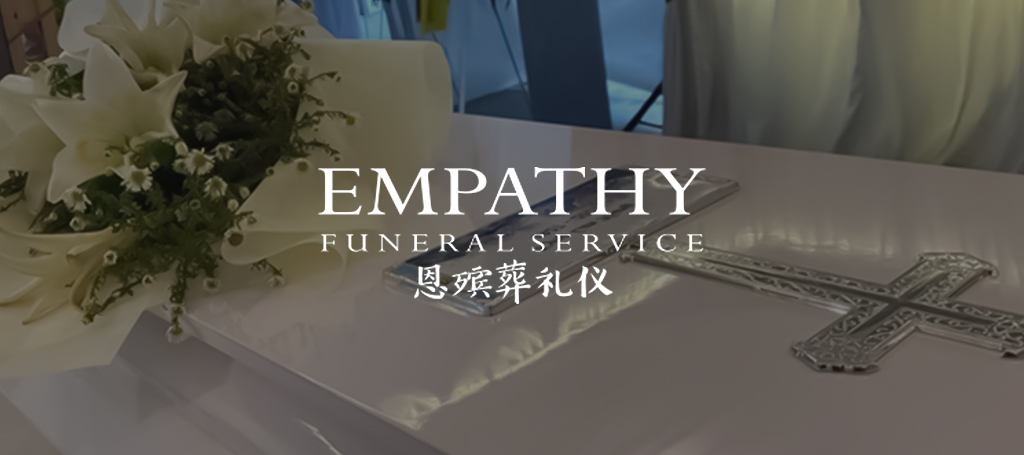
Website: https://empathyfuneral.sg/
Instagram: https://www.instagram.com/empathyfuneralservice/
Address: 6 Yishun Industrial Street 1 #08-13 North View Bizhub Singapore 768090 (Google Maps)
Contact: +65 6850 5023
Hours: 24/7
Empathy Funeral Services offers a comprehensive range of funeral services, from coordination to post-funeral ceremonies, including memorial services. It aims to empathise with grieving families by showing compassionate service.
The funeral home has an in-house team dedicated to handling every aspect of the funeral process. In turn, this keeps costs low, making the services accessible to everyone regardless of religious beliefs.
The team can arrange venues for Taoist and Buddhist post-funeral temple ceremonies, coordinate Christian memorial services, and even facilitate post-cremation sea burials.
It’s open 24 hours a day, with funeral directors at the ready to help bereaved clients take care of all wake and funeral arrangements.
Even the smallest details like flowers and funeral decor can be handled by the Empathy Funeral Service team.
Pros
- Open to any religious (or non-religious) service
- Offers several packages
- Offers post-funeral services
- Affordable rates
Cons
- Located in a primarily industrial area
- Food and beverages not yet included in the packages
Customer Reviews
They made the event simple yet touched our hearts
“This team is top-notch service. Everything is always on time. Made the entire wake absolutely beautiful and classy. Always easily contactable. And we were always supported. They made the event simple yet touched our hearts. Their professionalism made the entire wake and funeral dignified and memorable. Highly recommended.”
– Belle Lee, Google Reviews
Provided support and guidance at every step of the way
“A comprehensive funeral service provider that truly exhibits “empathy” by providing services that address the family’s concerns and needs. Providing support and guidance at every step of the way so we don’t have to worry and can spend the last few moments with our departed loved one. It was the impeccable service end-to-end that allowed my MIL’s last journey to be a beautiful one & be at ease. Grateful & appreciate Adam & team.”
– Angelina Or, Google Reviews
4. Direct Funeral Services
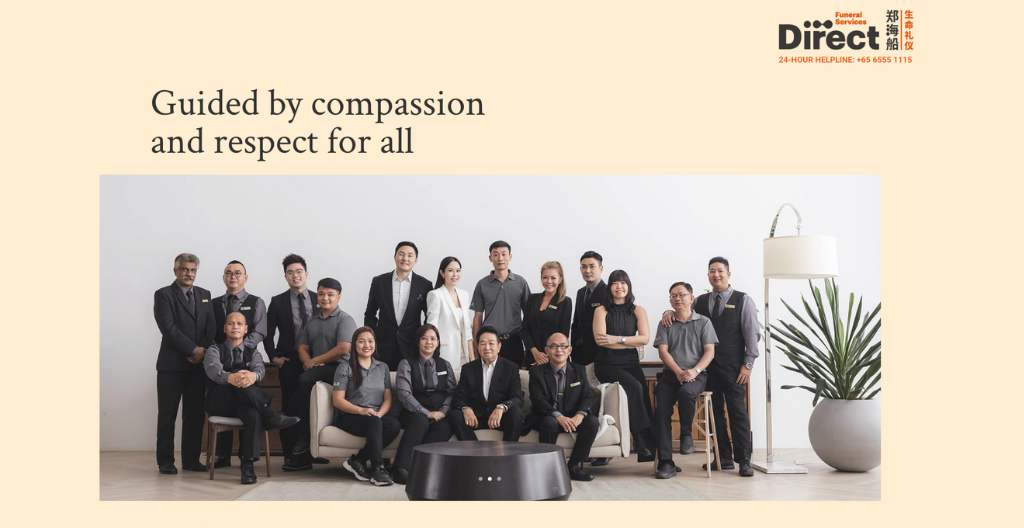
Website: https://directfuneral.com.sg/
Services: Buddhist Funeral, Taoist Funeral, Christian/Catholic/Freethinker Funeral, Funeral Pre-planning
Instagram: https://www.instagram.com/directfuneralservices/
Facebook: https://www.facebook.com/DirectFuneralServices/
Tiktok: https://www.tiktok.com/@directfuneralservices
Address: 127 Lavender Street., Singapore 338735
Contact: +65 6555 1115 (24-hour helpline) | [email protected]
Hours: Open 24 hours
For over three decades, Direct Funeral Services (DFS) has been a trusted name in the death-care industry, adapting to the evolving needs of families while preserving the essence of traditional send-offs.
With a deep commitment to honouring lives, DFS provides personalised and modern funeral services that allow families to commemorate their loved ones in a meaningful way. It understands that every farewell is unique, ensuring each ceremony reflects the legacy of the departed.
DFS also extends its support beyond funeral arrangements. It offers grief counselling to help families navigate loss, repatriation services for those who pass away overseas, and post-funeral assistance to ease the transition for the bereaved.
Its 3-day-2-night funeral packages cater to various beliefs, including Buddhist, Taoist, Christian, Roman Catholic, and Freethinker rites. These comprehensive packages include all essential ceremonial items, such as Buddhist offerings, Taoist paper houses and joss papers, and towel souvenirs for guests.
Partnering with Batesville, a renowned casket provider, DFS ensures families have access to high-quality caskets, reinforcing its dedication to providing only the best for their clients.
For those without a suitable wake venue, DFS offers its own memorial hall at Geylang Bahru Road. While easy to locate, the hall remains a peaceful and dignified space for remembrance.
Whether you’re seeking guidance on funeral arrangements, facing financial concerns, or struggling with grief, DFS is ready to assist. Its 24-hour helpline ensures that support is just a call away, making it a compassionate and reliable choice for funeral services.
Pros
- Affordable and all-inclusive funeral packages
- Inclusive of various religions
- Offers memorial hall
- Imported caskets
- Offers grief counselling
Cons
Customer Reviews
Sanctuary was well lit, with comfortable temperature
“Engaging Direct Funeral Services is probably one of the best decisions made. From the time we informed the passing of my father, Anson arrived on site swiftly. He slowly guided us along on what’s required and the possible packages according to how we wish to have the final journey mapped out for our father. The sanctuary was well lit, with comfortable temperature, ease of using the toilet and even a family room to rest for private quiet moments. Each day we (family members and my late father) were greeted with respect and services was professional and filled with compassion. Each and every detail was carefully planned and reminders given to us so as to make the entire wake and funeral procession fuss free and dignified. We were also given the chance to reminisce the wonderful life our father had with us through the video montage done for us. The funeral procession was nothing but praises as we also had a touching eulogy shared by Anson. The team also helped to take videos/photos for our keepsake. Even on the final day for the ash collection, we were greeted by Andrea with the most compassion and respect given to our father. She carefully guided us and my father to the car so we could bring him to his forever resting place. Abundance of heartfelt thanks and offering my most sincere review is an expression of my gratitude of the assistance rendered. Thank you team Direct.”
Efficient and friendly
“I highly recommend Direct Funeral Services. Anson and team were very efficient and friendly, starting from the initial consultation, hospital pick-up and throughout the wake and memorial. The Embalming team worked very well and turnaround time was very fast. The hall assigned to us at Mt Vernon Sanctuary was very beautiful and the floral arrangements were very classy. We are very pleased to have made the right choice during this difficult time.”
5. Singapore Funeral Sanctuary
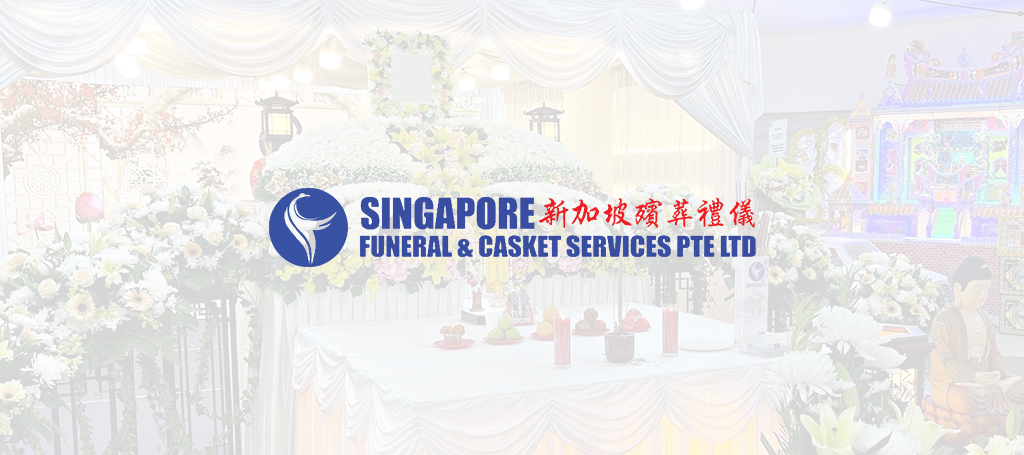
Website: https://funeralsanctuary.sg/
Instagram: https://www.instagram.com/sgfuneralsanctuary/
Address: 52 Ubi Ave 3, Frontier, Singapore 408867 (Google Maps)
Contact: +6589000000
Hours: 24/7
Singapore Funeral Sanctuary strives for quality service standards in the after-death industry. It has an inclusive approach, welcoming Buddhists, Taoists, Christians, Catholics, and those without religious affiliations.
The funeral home offers a comprehensive range of services, from elegant flower arrangements to sea burials, all delivered with what they call HEART: honesty, empathy, affection, respect, and transparency.
It offers both pre and post-funeral services including will writing, lasting power of attorney, insurance claims, and probate and letter of administration.
Singapore Funeral Sanctuary has also gone digital, offering online memorialisation in keeping with the times.
Pros
- Offers online memorialisation
- Reasonable rates
- Offers pre and post-funeral services
- Available 24 hours a day
Cons
- Food and drinks not yet included in some of the packages
- Office is in a primarily industrial location
Customer Reviews
Very touching to receive the photos
“Very fast response and efficient from Zick, from attending to us at the hospital, tentage set up and cremation till final resting place. The best cost I got was the price quoted, final bills settled as per quoted without any hidden costs and superb service provided. Very touching to receive the photos and video taken on the last departure hours by the staff for keepsakes. Highly recommended to those who need the service for their loved one.”
– David Ang, Google Reviews
Arranged the wake in a dignified and beautiful manner
“Darron and Zick sprung into action when I called them at the last minute to help arrange my aunt’s final rites. They were supportive, efficient and paid incredible attention to detail. When it came to arranging the wake in a dignified and beautiful manner, they accommodated our requests and actually came back on several occasions to check up on how everything was going. A very big thank you to Darren, Zick and their entire team for making my aunt’s last journey a smooth and dignified one that she would have been grateful for.”
– Ruth Smalley, Google Reviews
6. SFS (Singapore Funeral Services)

Website: https://www.sfs.com.sg/
Instagram:
Address: 4 Toa Payoh Industrial Park, #01-1341, Singapore 319056
Contact: +65 1800 800 8888
Hours: 24/7
Singapore Funeral Services (SFS) is a well-established provider of funeral services in Singapore, renowned for its commitment to offering dignified and respectful departures for loved ones. With over 20 years in the industry, SFS has built a reputation for excellence, professionalism, and compassionate care. Their funeral homes are designed to cater to the diverse needs of families, ensuring that each funeral service is tailored to honor the legacy of the deceased.
We like that families consistently praise the team for their compassionate and empathetic approach during difficult times. The staff at SFS are well-trained to handle every aspect of funeral arrangements, from initial consultations to the final send-off. This ensures that families can focus on mourning and commemorating their loved ones without the added stress of logistical concerns. Additionally, SFS offers a variety of packages tailored to different religious beliefs, including Buddhist, Taoist, Christian, Catholic, Soka, and Freethinker services. This flexibility allows families to choose the most appropriate and meaningful way to honor their deceased relatives.
We like that SFS are one of the few providers in Singapore with an NEA-certified embalming facility and certified embalmers. This ensures that the deceased are prepared with the highest standards of care and respect. The embalming process, which includes sanitization, preservation, and restoration, is conducted with meticulous attention to detail, ensuring the deceased’s appearance is lifelike and respectful.
Despite some reviews mention that the placement of tents can be inconvenient for residents, particularly in terms of accessibility for individuals with disabilities. In one instance, a reviewer noted that the funeral tent blocked access to a wheelchair ramp, causing significant inconvenience.
Overall, Singapore Funeral Services’ funeral homes offer a comprehensive and compassionate service that meets the diverse needs of families during their time of loss. The combination of professional and empathetic staff, state-of-the-art facilities, and tailored service packages ensures that every funeral is conducted with dignity and respect.
Pros
- Compassionate and professional staff
- State-of-the-art NEA-certified embalming facility
- Flexibility in accommodating both large and small gatherings
- Diverse religious service packages
Cons
- Isolated complaints about staff responsiveness and professionalism
Customer Reviews
Here are some reviews from their clients:
“SFS handled both my dads and mums wakes. First one in 2019 and the second one just last week. I could not have asked for a better team. Gerard was professional, compassionate, and most of all guided me the whole way from even before mum’s passing. He was patient with my requests and did all he could to help with the Audio Visual equipment, coming down to check on the set up and drinks and snacks stock regularly. Han handled the re ordering of items and assisted me almost daily. He was polite and friendly and the epitomy of professionalism. At the church and crematorium Gabriel assisted Gerard in ensuring we all knew what to do and where to go. It could not have been a smoother, more peaceful send-off for mum. I will be forever grateful that they were with us during mums final moments here on earth. All the staff were in suits and very very sensitive and polite during the entire wake and funeral. I cant recommend them enough. You wont go wrong in engaging their services. Many thanks to the SFS team for all their help and hard work. From me and my family.”
“It was beyond my expectations that we could received such meticulous support from SFS team led by Mr Hoo Hung Chye , during our bereavement at my mum’s wake. Their compassion, efficiency , team work was beyond words. At intervals and even night vigil were attended to. I couldn’t thank them enough. Deeply appreciated!Maria and family.”
7. Jasa Budi Muslim Casket Services
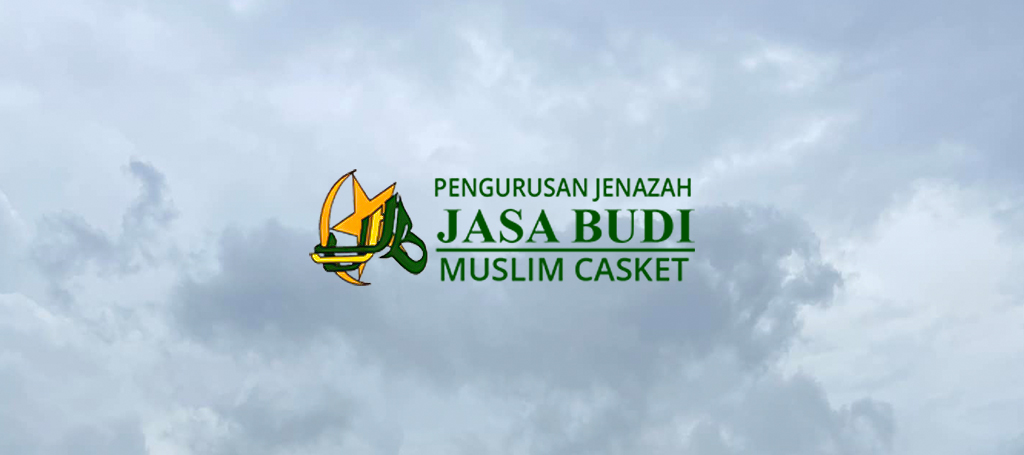
Website: https://www.jasabudimuslimcasket.com.sg/
Instagram: https://www.instagram.com/jasabudi_muslimcasket/
Address: 271 Pasir Ris Street 21, #04-464, Singapore 510271 (Google Maps)
Contact: +65 9657 4198
Hours: 24/7
Established in November 1999, Jasa Budi Muslim Casket Services offers a comprehensive range of services, from hospital to home and international repatriations. Its services cover the collection of the deceased from the home/hospital to the cemetery as well as transportation to bring the family to the mosque upon request.
Its overseas arrangements include embalming and coffin sealing, and they have a dedicated in-house doctor for death verification.
Jasa Budi is also a trusted supplier of caskets, equipment, and accessories to other Muslim organisations. The company extends support to the construction of grave monuments locally and internationally.
Pros
- Complete services with embalming and coffin for export
- Offers grave monument construction
- Available 24/7
Cons
- Muslim cemetery registration for burial is not included in the packages
- Pricier service rates
- Caters to Muslim clients only
Customer Reviews
Helpful, professional, and kind
“Jasa Budi was very helpful, professional and kind with the arrangement of my dad’s burial.
Everything went very smoothly. Many thanks on behalf of my family.”
– Khairul Nizam, Google Reviews
Supportive, very professional, and knowledgeable
“Thank you to Jasa Budi for helping out with my dad’s funeral. The staff are very resourceful, understanding, friendly and helpful. Ustadz Iskandar is supportive, very professional and knowledgeable as he shares and imparts his knowledge (especially on Hadith) to all, throughout the service. Thank you too, to Puan Jamilah for your kindness!
I highly recommend Jasa Budi Muslim Casket!”
– Mohammad Feroz, Facebook reviews
8. Trinity Casket

Website: https://www.trinitycasket.com/
Address: 38 Sin Ming Dr, #01-527/531, Singapore 575712 (Google Maps)
Contact: +65 6451 4496
Hours: 24/7
With over three decades of compassionate service, Trinity Casket understands that grief is sacred. Its service extends to everyone, from the destitute to relatives of parliament members.
With an in-house embalmer, the funeral home offers comprehensive funeral packages, covering everything from caskets to catering, ensuring clients don’t get bogged down in logistics during their time of mourning.
Its no-charge, no-commitment visit policy eases the process; mourners aren’t pressured to obtain their services after the initial visit. It also prioritises proper grieving by tailoring services to the client’s budget, with no upselling or hidden fees.
It’s open 24 hours a day and accepts calls at any time. Funeral arrangements can also be made in its offices, which are situated near major roads such as the Central Expressway (CTE) and Upper Thomson Road.
Pros
- No pressure to obtain services after initial visit
- Comprehensive funeral packages
- Can tailor costs to clients’ budgets
Cons
- No post-funeral services
Customer Reviews
The staff were polite, sensitive, and respectful
“Trinity Casket was very professional and handled my dad’s wake and funeral very well.
They were able to secure my dad’s cremation time in spite of the wake being only 2 days. The casket director Rodney also came with us to collect my dad’s ashes and bones.
The other staff-Perry and Sammy were also polite, sensitive and respectful of what my family needed those 2 days.
As the funeral ended late, they even allowed us to use their parlour to host the extended family for lunch at no extra charges
The cost was very reasonable and there were no hidden charges and upselling other services.”
– Benjamin Yeo, Google Reviews
Rendered good service with care and dedication
“Lost our mum on 8/11/2021. Although the cause was due to heart failure, COVID was the trigger point. From the list provided by the hospital to handle COVID cases, we chose Trinity Casket which was recommended by my cell group leader.
Thanks to Moses who provided the options opened to us. My siblings were able to come to an agreement on what was best for our mum. All was done in harmony.
Many thanks to Moses and his team who rendered good service with care and dedication.”
– June Goh, Google Reviews
9. An Lok Singapore Funeral Services
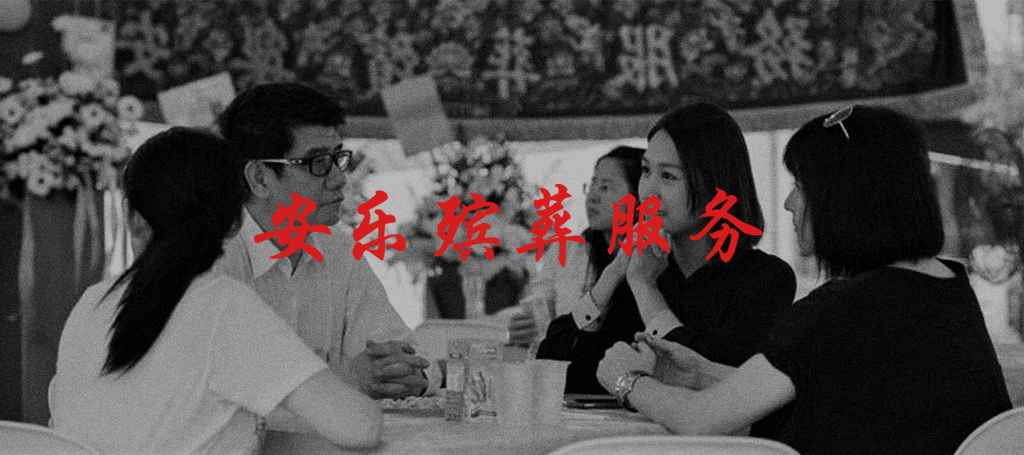
Website: https://www.singaporefuneralservices.org/
Instagram: https://www.instagram.com/anlokfuneral
Address: 38 Sin Ming Dr, Singapore 575712 (Google Maps)
Contact: +6594777774
Hours: 24/7
An Lok Singapore Funeral Services, serving since 1997, aims to simplify the funeral process. It offers direct cremation without a traditional wake and provides various religious and non-religious funeral packages.
Notably, it offers solemn Soka and unique Baha’i Faith funeral wakes, a rarity in Singapore.
The funeral home has a commitment to affordability, with no GST, service charge, or overtime fees.
Its comprehensive packages cover the general needs of a three-day funeral wake, reflecting its belief that grieving with peace of mind should be a priority accessible to all, not a privilege.
Pros
- Accommodates main religions and freethinker funerals
- Available 24/7
- No overtime charges
Cons
- Charges vary for set-up at private estates and funeral parlours
- Ceremonial items are on a consignment basis
Customer Reviews
Responsive to our needs
“Thank you Uncle Alvin for being so responsive to our needs and helping my family with the funeral. Thank you for arranging everything superbly smoothly. Alvin has shown his professionalism and has given us great advice on what is supposed to be done. Our whole family is deeply appreciative of his hard work despite his feet being hurt. Appreciate it.”
– Dylann Tan, Facebook reviews
Very efficient and responsive to our needs
“Very grateful to Alvin and team for providing one-stop services on the funeral arrangement. Very efficient and responsive to our needs. He assured n guided me and my family with many unsettled questions and eventually, everything went smoothly. Thank you once again Alvin.”
– Esther Lim, Facebook reviews
10. Singapore Casket

Website: https://www.singaporecasket.com.sg/
Instagram: https://www.instagram.com/singcasket/
Address: 131 Lavender St., Singapore 338737 (Google Maps)
Contact: +6562934388
Hours: 24/7
Established in 1920, Singapore Casket, has strived to blend tradition with modernity to ensure dignified, personalised funeral services for over a century. One of its unique offerings is the Memento Gemstone, which incorporates ashes into precious keepsakes.
Singapore Casket helps clients make informed choices through price transparency. For instance, its brochure shows that its Memorial Hall service starts at S$550, church parlour service starts at S$600, and HDB void deck service is from S$600/3 days.
Its embalmers and round-the-clock morticians give professional care, assuring bereaved families that their dearly departed is in good hands.
Stepping into one of its tranquil memorial halls, visitors will notice tasteful interiors and state-of-the-art technology, including free Wi-Fi internet access, safe box deposit (condolence box), massage chair services, TV, sound system, and hot beverage dispensers.
Located on Lavender Street, Singapore Casket is easily accessible via Lavender MRT (East-West Line).
Pros
- Tastefully furnished memorial halls
- Has over a century of industry experience
- Open 24 hours a day
Cons
- 60–90 working days for Memento Gemstone production
Customer Reviews
Heartwarming to see that my father left peacefully
“Thank you to all the staff at Singapore Casket for your professionalism in taking care of my late father’s wake and funeral from the start till the end. It is heartwarming to see that my father leaves peacefully and I am glad everything has been arranged and planned accordingly till his last day. My family is glad that we have hired your services and may his soul rest in peace.”
– Alvin Kee, Google Reviews
The set-up was fast & well done
“My family and I were impressed with the team from Singapore Casket. Both Francis and Lilian who assisted us were professional and fast to respond to all our queries. The set-up was fast & well done. They have done a good job. Thanks again to all who had assisted.”
– Lily Kong, Google Reviews
11. Harmony Funeral Care

Website: https://www.singaporefuneralservices.sg/
Instagram: https://www.instagram.com/harmonyfuneralcare_sg/
Address: 38 Sin Ming Dr, #01-523, Singapore 575712 (Google Maps)
Contact: +6594892424
Hours: 24/7
Harmony Funeral Care has been around for at least five decades in Singapore’s funeral industry. It even offers pro-bono funeral services, often referred by hospitals and hospices.
It has diverse religious leaders, including Catholic ministers, Christian pastors, Buddhist monks, and Taoist priests. This ensures that every funeral adheres to the appropriate rites.
It’s been run by the Hock Hin Undertaker family for over 55 years.
Harmony Funeral Care offers various funeral services, including specialised options like COVID-19 and baby funeral services.
It provides transparent pricing, non-obligatory consultations, and thoughtful offerings like live stream services.
Pros
- Over five decades of industry experience
- Available 24/7
- Offers free consultations/quotes
Cons
- Beverage and finger food on a pay-per-request basis
Customer Reviews
Provided a stellar service from start to end of the wake
“Engaged Harmony Funeral Care at the last minute after the unexpected passing of my mum. Harmony Funeral Care provided a stellar service from start to end of the wake. They offered various types of packages and prices were very transparent and easy to understand. They were not pushy to sell their services. The place was set up beautifully, and the guests were able to gather and grieve in a comfortable environment. Harmony even helped to contact the church to engage their pastors at such short notice. The workers at Harmony are also very helpful and respectful. I’m very thankful that my mum can be sent off in such a lovely way. Thanks, Harmony; Harmony, Jeremy, Angie.”
– Natalie Gayle, Google Reviews
Their attention to detail, empathy and understanding made the entire process much easier
“We cannot express our gratitude enough for your tireless efforts in making the funeral arrangements for our beloved father. Your attention to detail, empathy and understanding made the entire process much easier for us. Thank you for all you have done.”
– Diana Wan, Google Reviews
12. The Life Celebrant

Website: https://www.thelifecelebrant.sg/
Instagram: https://www.instagram.com/thelifecelebrant/
Address: Block 89 Geylang Bahru Industrial Estate #01-2738, Singapore 339697 (Google Maps)
Contact: +6566848488
Hours: 24/7
The Life Celebrant, led by founder Angjolie Mei, believes that “a funeral is not a day in a lifetime; it is a lifetime in a day.” It aims to add a compassionate touch to Singapore’s funeral industry with its unique services.
For instance, its “SHOWERS OF LOVE” concept blends Eastern and Western traditions, using origami paper cranes to help families express their final act of service to the departed.
Its compassion extends to psychological and emotional support, making the funeral home a comforting presence during times of grief.
It also has a no-obligations approach and offers repatriation services to further ease the journey for foreign clients.
TLC also offers a variety of funeral packages for different beliefs and child funerals with a mission to take the stress out of logistical matters.
Pros
- Offers an infant funeral service
- Available 24/7
- No-obligation quotes
Cons
- Online shop only carries books by the founder
Customer Reviews
The professionalism and patience make the whole process seamless, heartfelt, and meaningful
“Hi Angiolie, Michelle, Kenzie, and the TLC team, on behalf of my family, I would like to extend our appreciation and thanks for your advice, help, and support given to us during this difficult and painful period. It had allowed us the time and space to wholeheartedly mourn the death of our beloved father. Your professionalism and patience make the whole process seamless, heartfelt, and meaningful. We are very glad that the wake was held in a very peaceful and serene environment. Great recommendation. My dad had a grand and beautiful send-off.”
– Yee Choon Seah, Google Reviews
The set up of the wake was exceptional, serene and exuded a sense of peace
“I like to express my appreciation and gratitude to the TLC team who have so professional, thoughtful and thorough and lifted the burden off our shoulders during our time of bereavement. Michelle and her team showed the greatest respect and care for Papa and also great support to us. The set up of the wake was exceptional, serene and exuded a sense of peace. The showers of love ceremony where we got to clean and dress Papa was such a great session that I highly recommend it. It was very meaningful and therapeutic for me.”
– Jacqueline Lim, Google Reviews
13. Singapore Indian Casket

Website: http://www.indiancasket.com.sg/
Instagram: https://www.instagram.com/sgindiancasket/
Address: 88 Geylang Bahru, #01-2728, Singapore 339696 (Google Maps)
Contact: +6561005515
Hours: 24/7
For over a quarter of a century, Singapore Indian Casket has been a pillar of support for the local Indian community, honouring Hindu culture and faith. It aims to be a trusted partner for grieving Indian families by providing compassionate service.
Its comprehensive services cover casket packages to hearse rentals and repatriation.
Its dedicated team, led by founder SV Khanthan, has profound knowledge of Hindu rites and rituals. This ensures that each funeral is conducted with utmost respect and sensitivity.
The funeral home also offers a range of packages to accommodate both modest and elaborate funerals. The packages run from basic to grand.
Pros
- Good range of funeral package options to suit any budget
- Available 24/7
- Run by a team of local Indians
Cons
- Caters to the Singapore Indian community only
Customer Reviews
Never said no to all our requests
“Our sincere thank you to Mr Shanker and team for handling my mothers funeral on 22.02.2022 at Potong Pasir. Not only did you give us the time and space, but your attitude of not saying NO to all our requests was amazing. The explanation of every movement and the timing was perfect. We were very pleased with your never-say-no-no approach and teamwork. As days have passed by…..our thoughts are with our mum who made her last journey peacefully…..ALL THANKS TO YOUR TEAM. Thank you again.”
– Morgan Mariappan, Google Reviews
A service well done in a very peaceful manner
“Singapore Indian Casket recently conducted my father’s funeral. We express our thanks and gratitude for a service well done in a very peaceful manner. Will recommend their services to others.”
– Mala Hermann, Google Reviews
14. Passion Bereavement Care
Website: https://passioncare.com.sg/
Instagram: https://www.instagram.com/passionbereavementcare/
Address: 3 Gul Street 1, Singapore 629316 (Google Maps)
Contact: +6594503710
Hours: 24/7
Passion Bereavement Care is led by founder Deborah Kang. It specialises in Christian funeral services and holds the vision that every life deserves a dignified and adorned farewell.
Its comprehensive offerings include pre-planning, funeral packages, and land and sea burials. Beyond logistics, its mission is to send off the departed with peace, respect, and honour, regardless of their life circumstances.
The funeral home also offers support by way of grief counselling. This is to underscore its commitment to the emotional well-being of grieving Christian families.
Passion Bereavement Care is situated in an area well connected by road, making it easily accessible by both private vehicles and commercial transport. The nearby Jurong East area serves as a transportation hub with bus interchanges and an MRT station
Pros
- Available 24/7
- Offers grief counselling
- Offers livestream services
Cons
- Caters to Christian funerals and wakes only
Customer Reviews
I have been to many funerals but I have never seen such a beautiful setup
“My papa passed in April this year and my family and I engaged Passion Bereavement Care to handle the funeral after reading all the testimonials and reviews, and I must say it was the best decision. Deborah, Kenny & team went above and beyond and made sure everything was perfect. They were so helpful and genuine and made us feel at ease. I have been to many funerals but I have never seen such a beautiful setup. My papa must have been so glad and smiling from above. Thank you Deborah & Kenny for everything you have done for us! We really appreciate it!”
– Alicia Tan, Google Reviews
Going the extra mile in making the entire 5 days beautiful & memorable
“Really 6-star rating that we want to give to Deborah, Kenny & their team, for the fantastic & caring services. Near-perfection work & coordination show their experience in handling various situations. Going the extra mile in making the entire 5 days beautiful & memorable. Kudos to the team for all the hard work & efforts!”
– Jessie Ching, Google Reviews
15. A.Lifegrad Funeral Services

Website: https://www.alifegrad.com/
Instagram: https://www.instagram.com/alifegrad_funeral/
Address: Northstar@AMK, 7030 Ang Mo Kio Ave 5, #05-45 Singapore 569880 (Google Maps)
Contact: +65 6262 3086
Hours: 24/7
A.Lifegrad Funeral Services is a third-generation family-owned establishment in Singapore. It’s been around since the 1960s and is now led by founder and experienced funeral director Vincent Ng, who has over 20 years of experience in the funeral trade.
Available 24/7, the funeral home provides immediate assistance and offers a wide array of funeral services, from pre-planning to tributes. It caters to diverse religious ceremonies and even free-thinking rituals.
As implied by its name, the funeral home aims to create a “life graduation” ceremony that leaves a lasting impression. Its team wants to support bereaved families through every step of their journey.
Aside from funeral packages for different faiths, A.Lifegrad Funeral Services also has a direct cremation package that starts at just S$888.
Pros
- Affordable direct cremation package
- Has various packages for different religions
- Available 24/7
Cons
- Not a lot of post-funeral services
- Snacks and refreshments not covered in lower-tiered packages
Customer Reviews
We are grateful for their guidance and professionalism
“Thanks to Vincent, John and their team. We are grateful for their guidance and professionalism which helped made our dad’s last journey a smooth and pleasant one.”
– Amelia Chee, Google Reviews
The whole wake was handled with much compassion and was dignified
“Appreciate Vincent’s help and service in giving our beloved late Mum a proper send-off. We were impressed by the prompt service and expertise rendered throughout the whole process. The whole wake was handled with much compassion and was dignified, exactly what my late Mum would have wanted. Thank you.”
– Suzy Ang, Google Reviews
16. Singapore Funeral Solutions
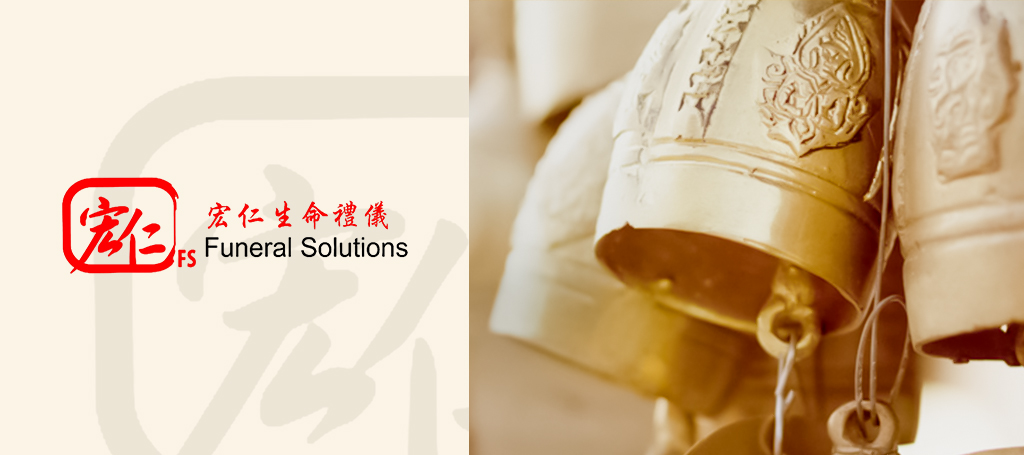
Website: http://www.funeralsolutions.com.sg/
Address: Sin Ming Dr, #01-523 Block 38, Singapore 575712 (Google Maps)
Contact: +6588225528
Hours: 24/7
Singapore Funeral Solutions is rooted in local tradition, aiming to preserve the Singaporean touch in its funeral services. It’s led by founder Nicky Teo, who embarked on his journey at just 17 to become an expert in Buddhist and Taoist practices.
The funeral home’s mission is to ensure that each service is not just a farewell but a cherished and memorable tribute.
Its offerings, from Buddhist and Taoist funeral packages to direct cremation and memorial services (including Gong Teck memorials), can be personalised.
It provides round-the-clock service too, and for clients who prefer not to hold a wake, the company also offers direct cremation services.
Pros
- 12 years of experience in the funeral trade
- Offers post-funeral services
- Available 24/7
Cons
- Primarily focused on Buddhist and Taoist funerals
- Slightly pricier packages (S$5,588 for a 3-day Buddhist funeral and S$7,588 for a 3-day Taoist funeral)
Customer Reviews
The funeral directors were guiding us from the start to the very last day
“Well organised team. Neat and tidy arrangements. The funeral directors were guiding us from the start till the very last day. I would highly recommend Nicky and his team for their excellent service and the great knowledge in Buddhist funeral services.”
– Alfred Wong, Google Reviews
Professional and affordable
“Professional and affordable pricing, really no hidden cost! Honest!”
– Dominic Lee, Google Reviews
17. Reliant Funeral Services
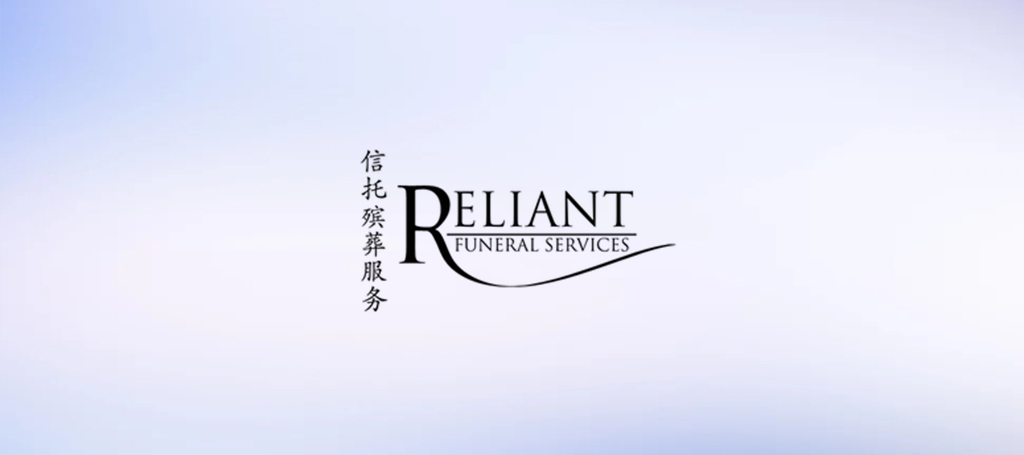
Website: https://www.reliantfuneral.com/
Instagram: https://www.instagram.com/reliantfssg/
Address: 88 Geylang Bahru, #01-2720, Singapore 339696 (Google Maps)
Contact: +6590069632
Hours: 24/7
Reliant Funeral Services has been a presence in the Singapore funeral service trade since 2005. Its versatility spans various faiths, serving Christians; Buddhists, including Soka practitioners; Taoists; and freethinkers alike.
It aims to give the deceased a dignified farewell with services tailored to each belief system; for instance, it offers Gong Teck for Buddhists and Taoists. It also offers post-funeral services like exhumation and repatriation.
Reliant offers the bereaved a simplified process and a 24/7 hotline to provide much-needed ease during difficult times. It’s located in Geylang Bahru, a culturally diverse neighbourhood.
Pros
- Caters to different religions
- Offers post-funeral services
- Available 24/7
Cons
- Smallish company with limited staff
Customer Reviews
Everything was handled beautifully, from the prayers to the collection of the ashes
“As its name suggests, Reliant was a strong pillar of support throughout my father’s funeral. Being unfamiliar with Taoist funerals, we depended greatly on this wonderful company to guide us. On top of knowing exactly what they were doing and being efficient, they were also honest, trustworthy and sensitive in their interactions with us. Everything was handled beautifully, from the prayers to the collection of the ashes. Everyone was professional, friendly and easy to communicate with. It was also helpful that the team could speak English, Mandarin and Hokkien. Words can’t sufficiently describe how grateful I am to Xiu Li and her team. I would strongly recommend this company if you’re in the unfortunate position of having to plan a funeral for a loved one as I am certain that you will be in good hands.”
– Szu, Google Reviews
Thank you for making my dad’s transition so smooth
“Reliant has been extremely efficient and understanding during this difficult time. They allowed us to not have to worry about the many multiple details and allowed us to focus on our late dad and our grieving process while they dealt with all the logistical matters as it relates to the funeral matters. An amazing team from the helpers to the priests to the Lao Ban Niang Xiu Li. They were so understanding and gave a lot of good advice. Thank you for making my dad’s transition so smooth. I cannot say enough good things about them and feel extremely grateful to them. Highly highly recommend using them.”
– Sue Toh, Google Reviews
18. New Century Funeral Services
Website: https://newcenturyfuneralservices.com/
Instagram: https://www.instagram.com/newcenturyfuneral/
Address: 4 Toa Payoh Industrial Park, Singapore 319056 (Google Maps)
Contact: +6581215442
Hours: 24/7
New Century Funeral Services’s practice embraces diversity in faith. Its services extend to Buddhists, Taoists, Christians, and non-religious individuals, providing tailored funeral packages and direct cremation services.
Its main mission is to ensure that even the simplest arrangements are comprehensive yet affordable. The New Century team offers guidance from the pickup of the departed loved one to the different steps of obtaining the necessary certifications.
The funeral home offers post-funeral care for Buddhist and Taoist funerals and other burial arrangements such as sea burials and international repatriation.
Its location is well-connected to major roads and expressways, making it accessible by both private vehicles and commercial transport.
Pros
- Serves different faiths
- Offers post-funeral care
- Available 24/7
Cons
- Pricier rates (Taoist funerals start at S$8,788)
- Food and beverages require add-on rates
Customer Reviews
Their service was very wholesome
“Took the Buddhism funeral. Director Tay and his crew were very informative and helpful in guiding us throughout the whole process. Their service was very wholesome and we do not need to worry about missing out anything.”
– Glenn Lxw, Facebook reviews
Thank you for helping us through the process from beginning to end
“Thank you New Century Funeral Services and Jack Tay and team for taking care of my dearest mum’s funeral service. Thank you for helping us through the process from beginning to end. We were not prepared for Mom’s death. We appreciate all the support from the entire staff.”
– Patricia Heng, Facebook reviews
19. Nituo Funeral Care Services

Website: https://nituofuneral.com/
Instagram: https://www.instagram.com/nituofuneralcare/
Address: 15 Lor 13 Geylang, Singapore 388653 (Google Maps)
Contact: +6596850418
Hours: 24/7
Nituo Funeral Care Services, a family-run funeral parlour since 2012, stands against industry giants with a refreshing commitment to empathy. Its packages cater to Buddhist, Taoist, and Christian funerals.
Its mission is to streamline the funeral process, eliminating hidden costs.
Moreover, Nituo offers customisable funeral rites for a thoughtful touch, including specific Taoist rites. It has done mixed funerals that feature Taoist priests and Buddhist monks.
Even with reasonably priced packages, the team remains open to compromises and adapts pricing based on individual circumstances when needed.
Pros
- Available 24/7
- Open to adapt pricing according to circumstance
- Caters to different religions
Cons
- Smallish company could lack manpower
- No post-funeral services
Customer Reviews
Went above and beyond to serve us
“Really appreciate Nituo’s effort. They went above and beyond to serve us in amenities and service. Truly professional.”
– Tan Wee Kiat, Facebook reviews
Made my Kin’s passing a peaceful and harmonious journey
“Thank you guys for all that you have done. It was really tough to get through the funeral knowing that I had lost someone who was a big part of my life. Thank you for making my Kin’s passing a peaceful and harmonious journey for all of us.”
– Wong Mei Ling, Facebook reviews
20. Ang Chin Moh Funeral Directors
Website: https://www.angchinmoh.com.sg/
Instagram: https://www.instagram.com/angchinmoh_funeraldirectors/
Address: 88 Geylang Bahru, #01-2724, Singapore 339696 (Google Maps)
Contact: +6562263333
Hours: 24/7
With over a century of service, Ang Chin Moh Funeral Directors aims to be a pillar of support to the bereaved in Singapore. It even offers pro bono funerals to those who can’t afford it or have no next of kin.
Founded by Mr. Ang See Karr in 1912, it continues to provide quality and essential funeral services to the Chinese community in Singapore. Its offerings are vast, covering religious, personalised, freethinker, green, and infant funerals alongside unique services like memorial diamonds and ash scattering.
Its mission is simple: to guide grieving families with compassion and dignity during their time of loss. Clients can ask for a free quotation and consultation.
Serving both local and international clients, Ang Chin Moh Funeral Directors wants to deliver fitting memorial services across diverse religious affiliations and economic backgrounds.
Pros
- No-obligations quotes
- Available 24/7
- Over 100 years in the funeral trade
- Provides pro bono funerals for destitute clients
Cons
- Doesn’t accept cash payments
Customer Reviews
Ang Chin MOH is professional and responds timely whenever we need help
“We are grateful to have engaged Ang Chin MOH Funeral Directors as our undertakers as we do not really know what to do when my father-in-law passed on in hospital. My mother-in-law is aged and was a very conservative Hainanese Taoist and I am a catholic. Imagine the conflict the family has to face without an experienced undertaker. Ang Chin MOH is professional and responds timely whenever we need help during the 5 days of wake at the HDB void deck. The family is very satisfied very their service as the whole process went smoothly without hiccups. Once again a big Thank You.”
– Cache Tan, Google Reviews
Kudos to the team who tended to my queries and their empathy
“My first time with ACM, was very impressed with the professionalism and service, will highly recommend it with my experience. Kudos to the team who tended to my queries and their empathy. My thanks to Mr Ang and his dedicated staff.”
– Ian Chan, Google Reviews
21. Serenity Casket and Funerals
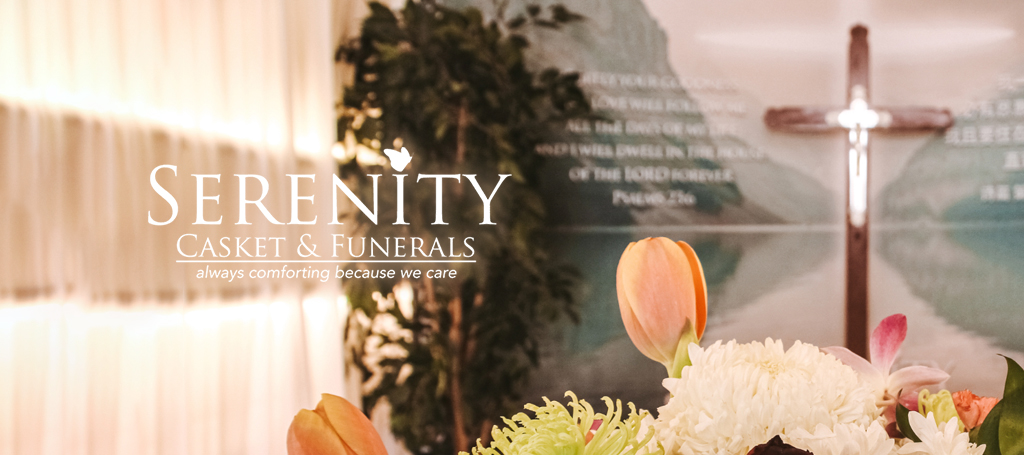
Website: https://www.serenitycasket.com.sg/
Instagram: https://www.instagram.com/serenitysg/
Address: 84 Geylang Bahru, #01-2686, Singapore 339692 (Google Maps)
Contact: +6562896689
Hours: 24/7
Serenity Casket and Funerals is a family-run funeral home that’s been in the business since 2009. Its founder Elson Chong has a vision for a sincere, human-centered service.
Notably, the company has female embalmers, with Sarah Ang, one of Singapore’s first certified female embalmers, leading the way.
It offers comprehensive funeral packages tailored for Christians and freethinkers along with services like direct cremation, ash scattering, and repatriation services.
Its all-inclusive packages start at just S$3,600.
The funeral home also provides an elevated level of service with Freccia Maserati and Mercedes Premier limousine hearses, ensuring a dignified and elegant farewell for loved ones.
Pros
- One of the first to have female embalmers
- Offers repatriation and direct cremation
- Affordable base rates
Cons
- Serves only Christians and freethinkers
Customer Reviews
The team seamlessly handled all the arrangements
“We are appreciative of the support provided by Serenity Casket & Funerals during our time of loss. Their understanding, and attention to detail were truly comforting. The team seamlessly handled all the arrangements, allowing us to focus on honouring our loved one. We recommend Serenity Casket & Funerals for their exceptional service that truly goes beyond expectations.”
– Moe Wong, Google Reviews
It has been an excellent and peaceful experience
“It has been an excellent and peaceful experience. Serenity is professional with their service from my first phone call to the end at Garden of Peace. Merson is a good listener and patient. His professional advice has made my decision easier to proceed with the funeral arrangement. Serenity’s team is well-mannered and cooperative. The whole funeral setup is well decorated and lovely touches like flowers, tablecloth and setting of reception (with record book, pens, box of tissues and mini safe). I would highly recommend Serenity for their outstanding service to the bereaved’s family. Well done Serenity, keep up the admirable work.”
– Red Tan, Google Reviews
22. Casket Fairprice
Website: https://casketfairprice.com/
Instagram: https://www.instagram.com/casketfairprice/
Address: Sin Ming Dr, #01-571 Blk 37, Singapore 575711 (Google Maps)
Contact: +6564559909 | [email protected]
Hours: 24/7
Casket Fairprice has been an established name in the funeral industry since 1993. Its CaseTrust accreditation ensures reliability, while its innovative approach includes accepting credit card payments, complete with a 12-month instalment plan and no surcharges.
Its comprehensive services embrace diverse religious affiliations, from Buddhists to Roman Catholics and freethinkers.
The funeral home aims to navigate every aspect of funerals with professionalism and respect. It does so with services ranging from pre-planning consultations to embalming.
Casket Fairprice is committed to transparency with free phone consultations, no-obligation bookings, and honouring its advertised quotes without hidden charges.
Its spacious funeral homes come equipped with individual restroom facilities, free Wi-Fi, and air conditioning. Its location is within an area of housing estates and tranquil green spaces.
Pros
- Accepts instalment payments with no surcharges
- Well-appointed funeral parlours
- Caters to different religions
Cons
- Doesn’t accept cash payment
Customer Reviews
Responsive to all the questions that the family had and guided us along the way
“Dear Roger, thank you for your time, presence and support towards my dad’s final journey! You have been responsive to all the questions that the family had and guided us along the way. We are extremely happy with the Ang Mo Band, Ash Collection, Sea Burial arrangements and the elegant setup at the wake. Once again, thanks for the great memory which the Fairprice casket team had created.”
– Florence Gwee, Google Reviews
Very well-prepared and patient in guiding us through the different parts of the process when we were still dealing with our grief
“Mr Tan Yong Bin and his team were very efficient and polite with our family members in handling my mother’s funeral. He was very well-prepared and patient to guide us through the different parts of the process when we were still dealing with our grief. Thank you very much for being so kind and understanding towards us. We are tremendously grateful.”
– Bryan Low, Google Reviews
23. Ang Brothers Funeral Services
Website: https://www.funeralservicessingapore.com.sg/
Instagram: https://www.instagram.com/angbrothersfuneral/
Address: 55 Serangoon North Ave 4, #02-07 S9 Building, Singapore 555859 (Google Maps)
Contact: +6598718388
Hours: 24/7
With roots tracing back to the 1950s, Ang Brothers Funeral Services has become a well-known name in Singapore’s funeral industry. It has exemplified consistency by maintaining unchanged prices for the past decade.
Its services extend a compassionate hand to Buddhists, including Soka practitioners; Taoists; Christians; and freethinkers alike.
It’s committed to providing affordable funeral services in Singapore. This is reflected in its funeral packages, with direct funeral services starting at just S$1,080 and funeral flower services and international repatriation packages starting at just S$2,000
Ang Brothers Funeral Services also offers flexible instalment payment plans.
Pros
- Affordable and all-inclusive funeral packages
- Inclusive of various religions
- Offers grief counselling
- Offers memorial hall
- Imported caskets
Cons
- Not inclusive of Soka funerals
- Not inclusive of food catering
Customer Reviews
The team is attentive to details, gives clear advice and is very patient with my family
“My family would like to express our deepest gratitude to Ang Brothers for managing the funeral of my mother. Joyce, Dragon and the team are attentive to details, give clear advice and are very patient with my family. They are responsive and prompt to give help. Full of respect for their professionalism.”
– Carol Hor, Google Reviews
We are glad we chose Ang Brothers to send our beloved father off
“Thank you Ang Brothers Funeral Services. It was the first time for our family to go through such an event and we are sincerely grateful for your responsiveness and patience. Thanks to Joyce, Dragon, Lion and the Team for everything during this past week. It has been the longest one week we had but we are comforted by your service. Your transparency and guidance have been most helpful. We are glad we chose Ang Brothers to send our beloved father off. From the bottom of our hearts, thank you for walking this journey with us.”
– Shan Chua, Google Reviews

